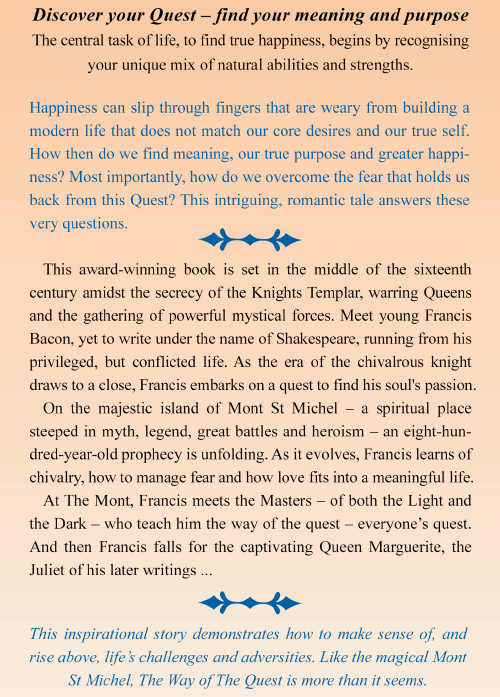From the Back of the BookWhy I Wrote this BookThe philosopher Søren Kierkegaard is generally considered the founder of existentialism. He maintained that the individual is solely responsible for giving his or her own life meaning and for living that life passionately and sincerely. (See the quote from Kierkegaard below.)
My first book and my work in managing weight loss from a psychological perspective brought me to a clear juncture in therapy. As I listened to more and more patients, I realised that their over-eating had its roots in a problem that is dear to the heart of any psychiatrist with an understanding of existentialism - my patients were eating their meaninglessness! To put it another way: when eating becomes the most meaningful part of your day, you have a hunger that will demolish any diet you put in front of it. And then my son, at fifteen, was having to take the all-too-early decisions about which direction to head his education in. Meanwhile my daughter was having to decide her direction having just started university. The Alchemist had addressed the importance of following one’s passion, but not the ‘how to’. As a practicing, clinical psychotherapist that was something I addressed every day – so the book became a vehicle in which I embedded all that I had come to understand about the importance of creating meaning (and from that, one’s purpose) out of a life that is otherwise inherently meaningless. |
THE PREMISE
The premise of this award-winning inspirational novel is that we cannot be truly happy if we are not clear on what is meaningful for each of us and we are not pursuing a purpose that reflects this meaning. Coming from the experience of a practicing psychiatrist, this illustrative novel takes the reader on a journey to answer the three questions that most of us struggle with: Who am I? What am I here to do? What is holding me back from pursuing what I am here to do? THE NOVEL While winning awards in both 'Inspirational fiction' and 'Visionary Fiction' categories, The Way of The Quest might be best called a ‘motivational, self-help novel’. Inspired in equal parts by the tales of King Arthur and Paulo Coelho's The Alchemist, it was written by Dr George Blair-West as a fun, engaging story set as the era of the chivalrous knight is drawing to a close. As a practicing psychotherapist, Dr Blair-West wrote the book to go a step further than The Alchemist and look at the practical ‘how to’ of finding and following one’s purpose while managing the fear that holds us back. It follows the life of a sixteen-year-old boy leaving his home in England and travelling to the magical Mont St Michel in search of both adventure and himself. Coming from wealth and privilege, instead of staying in Paris as instructed by Queen Elizabeth, he takes off to Mont St Michel to train under the greatest knight of all time. Francis Bacon, a real life figure, is no ordinary young man. Later in life he will be acclaimed as one of the geniuses of his age as he will go on to forever change the worlds of law, science and literature. When you meet him, however, he is a confused 16-year-old trying to find his way. This book follows the course of his fascinating life as meets the great teachers on The Mont who set him on his path ... and the woman he falls for who inspires him to follow it. There are stories within stories, legends withing legends and layers upon layer - click here for more |
Søren Kierkegaard
Unlike most Existentialists, who come from non-religious perspectives, he was a Christian, but was more than comfortable with those of other religions, or those without religion, pursing meaning nevertheless. Here is how he sees life:
"What I really need is to get clear about what I must do, not what I must know, except insofar as knowledge must precede every act. What matters is to find a purpose, to see what it really is that God wills that I shall do; the crucial thing is to find a truth which is truth for me, to find the idea for which I am willing to live and die. (...) I certainly do not deny that I still accept an imperative of knowledge and that through it men may be influenced, but then it must come alive in me, and this is what I now recognize as the most important of all." |
